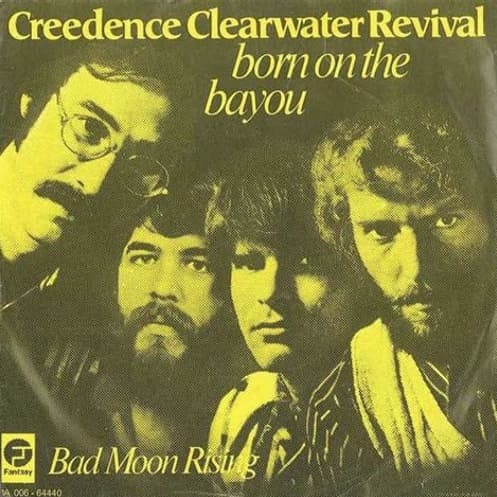
Creedence Clearwater Revival – “Born on the Bayou”: A Swampy Rock Classic Full of Grit and Nostalgia
Creedence Clearwater Revival’s (CCR) “Born on the Bayou” is a quintessential Southern rock anthem, steeped in the imagery and atmosphere of life in the Louisiana swamplands. Released in 1969 as the opening track of their acclaimed album Bayou Country, the song became a defining moment in CCR’s catalog and a cornerstone of the swamp rock genre. Written by John Fogerty, the track captures a vivid sense of place and identity, blending gritty instrumentation with evocative storytelling.
The song begins with a haunting, swampy guitar riff, immediately immersing the listener in its humid, mysterious world. The slow, pulsating rhythm, driven by a thick bassline and Fogerty’s signature tremolo-laden guitar, sets a hypnotic tone that mirrors the still but charged energy of the bayou. This layered, atmospheric arrangement reflects CCR’s ability to paint vivid musical landscapes, transporting the listener into the heart of the song’s narrative.
Lyrically, “Born on the Bayou” is a nostalgic ode to a Southern upbringing, even though Fogerty himself wasn’t from Louisiana. Lines like “When I was just a little boy, standin’ to my daddy’s knee / My poppa said, ‘Son, don’t let the man get you and do what he done to me’” evoke themes of heritage, resilience, and defiance. The bayou becomes a symbol of both a physical place and a state of mind, representing freedom, authenticity, and a deep connection to nature.
The chorus, “Born on the bayou,” is delivered with raw power and conviction, its repetition amplifying the song’s anthem-like quality. Fogerty’s gritty, soulful vocals bring an authenticity to the track that resonates deeply with listeners. His delivery, filled with both pride and longing, captures the complexities of remembering and yearning for a simpler, more grounded way of life.
Fogerty’s guitar work is a standout element of the track, blending bluesy licks with swampy textures that give the song its distinct sound. The rhythm section, featuring Stu Cook’s bass and Doug Clifford’s drums, provides a steady, driving foundation that propels the song forward while maintaining its earthy feel. The interplay between the instruments creates a rich, dynamic soundscape that feels both raw and polished.
The production is minimal yet effective, emphasizing the organic, unvarnished qualities of CCR’s music. This straightforward approach allows the emotional weight of the lyrics and the energy of the instrumentation to take center stage, reinforcing the song’s timeless appeal.
“Born on the Bayou” quickly became one of CCR’s most iconic tracks, regularly featured in their live performances and celebrated as a defining example of swamp rock. Its themes of identity, place, and defiance resonated with audiences during the late 1960s and continue to hold relevance today. The song’s enduring popularity is a testament to CCR’s ability to create music that is both deeply rooted in tradition and universally appealing.
The track has been featured in numerous films, TV shows, and commercials, further cementing its place in pop culture. Its gritty, evocative sound has inspired countless artists and helped to define the swamp rock genre, influencing a wide range of musicians across decades.
In the end, “Born on the Bayou” is more than just a rock song—it’s a cultural touchstone that celebrates the spirit of the South and the universal yearning for connection to one’s roots. Creedence Clearwater Revival’s masterful performance, paired with John Fogerty’s vivid storytelling and iconic guitar work, creates a track that continues to inspire and captivate listeners. For fans of rock, blues, and Americana, “Born on the Bayou” is a timeless classic that stands as a testament to the power of music to evoke place, memory, and emotion.